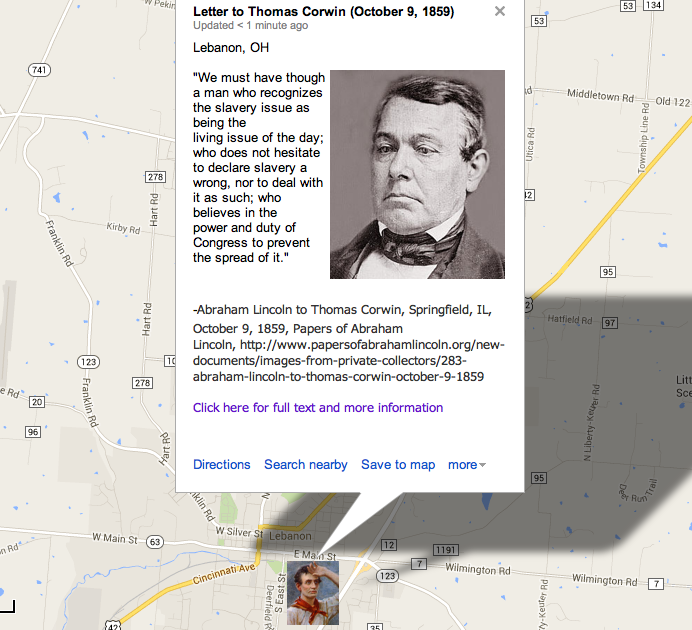Contributing Editors for this page include Jim Coe
Ranking
#108 on the list of 150 Most Teachable Lincoln Documents
Annotated Transcript
On This Date
HD Daily Report, October 9, 1859
The Lincoln Log, October 9, 1859
Close Readings
Custom Map
How Historians Interpret
“Despite his modesty, Lincoln between August 1859 and March 1860 positioned himself for a presidential run by giving speeches and corresponding with party leaders in several states, among them Iowa, Ohio, Wisconsin, New York, Connecticut, Rhode Island, New Hampshire, and Kansas. At the same time, he labored to keep Republicans true to their principles by having them steer a middle course between the Scylla of Douglas’s popular sovereignty and the Charybdis of radical abolitionism. Only thus could he and his party capture the White House. And only thus could a lesser-known Moderate like himself lead the ticket. Lincoln took encouragement from the ever-widening rift in the Democratic party over such issues as a federal slave code for the territories and the reopening of the African slave trade. To Herndon and others he said, in substance: ‘an explosion must come in the near future. Douglas is a great man in his way and has quite unlimited power over the great mass of his party, especially in the North. If he goes to the Charleston Convention [of the national Democratic party in 1860], which he will do, he, in a kind of spirit of revenge, will split the Convention wide open and give it the devil; & right here is our future success or rather the glad hope of it.’ Herndon recalled that Lincoln ‘prayed for this state of affairs,’ for ‘he saw in it his opportunity and wisely played his line.'”
NOTE TO READERS
This page is under construction and will be developed further by students in the new “Understanding Lincoln” online course sponsored by the House Divided Project at Dickinson College and the Gilder Lehrman Institute of American History. To find out more about the course and to see some of our videotaped class sessions, including virtual field trips to Ford’s Theatre and Gettysburg, please visit our Livestream page at http://new.livestream.com/gilderlehrman/lincoln
Searchable Text
Springfield, Oct. 9, 1859
Hon. Thomas Corwin
My dear Sir:
Reaching home yesterday I for the first received yours of Sept. 24. I reply in a hurry, because of the sentence in your letter, in these words, “I was sorry to hear from you, that a moderate man on our side would lose Illinois by 50,000.” Whether you understood me as having said this in the speech at Cincinnati, or somehow else, I am not certain; but I am certain I have not meant to say it anywhere. I did say at Cincinnati, that a candidate who shall turn up his nose at the Republican cause, could not carry Illinois by 50,000, but I am not considering such a man as “a moderate man on our side.” I understand such a man as not being on our side at all; and as seeking to drive us to abandon our side ourselves. They know we would organize to prevent the spread and nationalizing of Slavery; and yet they tell us they are tired of this view, and they invite us to abandon this view, and to join them against the Administration on the tariff, extravagances, live oak contracts, and the like –the very old issues upon which the whig party was beat out of existence. Now I have expressed, and today repeat, that such an arrangement would lose Illinois by 50,000. The thing is pretense. The whigs here were in a minority of 15,000. A full fifth of them have openly gone over to the enemy; still last year the Republicans had a large plurality, and very nearly a clear majority. How was this? Simply that more democratshave gone with us, than whigs have gone against us. What brought these democrats with us? The Slavery issue. Drop that issue and they have no motive to remain, and will not remain with us. It is idiotic to think otherwise.
Do you understand me as saying Illinois must have an extreme anti-slavery candidate? I do not so mean. We must have though a man who recognizes the slavery issue as being the living issue of the day; who does not hesitate to declare slavery a wrong, nor to deal with it as such; who believes in the power and duty of Congress to prevent the spread of it. It would be unfavorable to us, I think, to have one who is bent on having a “rumpus” over the Fugitive Slave Law. The present law I do not think is a very seemly one, but I do think an efficient fugitive slave law is demanded [by] the Constitution. I said this is in the canvass last year; and I said nearly the same in the Cincinnati speech. But I think you understand me.
Yours very truly,
A. Lincoln

